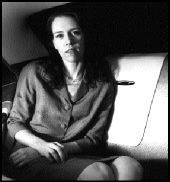GILLIAN WELCH, DAVID RAWLINGS
Showbox, 628-3151, $17.50 adv/$20 8 p.m. Tues., Aug. 28
“I GOT A LITTLE WIGGED OUT,” says Gillian Welch. She’s talking about the ongoing O Brother phenomena, as she calls it. “I think there’s a cyclical reaction to a bunch of other stuff going on,” she says, during a long couple hours of tour interviews and digging out of her “mountain of shit.” “It’s a reaction to things people are combating in their everyday lives, commercial radio, even commercials.”
But any explanation is clearly a guess. “The fact that traffic is getting worse may be increasing O Brother sales,” she says.
In case you’ve missed it, the heartfelt singer-songwriter is referring to the who-would’ve-guessed-it, overwhelming, stunning success of the soundtrack album for O Brother, Where Art Thou? Since the film’s December 2000 release, the album has gone platinum in the U.S. and sold two million copies worldwide, and still sells 70,000 copies a week. “I was surprised at first, and I was really shocked that it continues,” she says. Welch has two songs on the album. She wrote and sings the poignant “Didn’t Leave Nobody But the Baby,” an adaptation of a hill country lullaby, with Alison Krauss and Emmylou Harris, and makes an achingly beautiful duet with Alison Krauss on the standard “I’ll Fly Away.” She also played a bit part in the film and has a key role in the documentary Down from the Mountain, which captured a one-night-only concert of the film’s music in Nashville. A live soundtrack from that film was released late last month.
Whatever the explanation for the grand slam of such an obscure collection, O Brother‘s mix of traditional American classics has brought old-school folk and bluegrass back onto the sidewalks of popular culture. “One interesting fallout from O Brother I can’t believe,” says Welch, “is that there are 10-year-old kids walking about Washington, D.C., singing I Am a Man of Constant Sorrow.”
While that album’s popularity may be less surprising to anyone who’s followed the No Depression bandwagon, it’s still a big leap for most of America to think of “You Are My Sunshine,” even the heartbreaking version included in the film, as anything but kids’ fare. And plenty of journalists and radio jocks have a hard time categorizing the sound. In Welch’s own batch of mostly glowing—and deservedly so—reviews, she’s described as country, alternative country, hillbilly, blues, roots, contemporary folk, American folk, and Americana. “It shows that we do something that is different and difficult to describe without a knee-jerk reaction,” she says. Mostly she’s OK with the lack of an established genre; she says, “I don’t like it when people look at two people playing acoustic guitars and make judgments.”
Welch plays and co-writes with longtime partner David Rawlings. “We’re a very little band called Gillian Welch,” she says. He’s named as producer on the new record, called Time (The Revelator). It’s their third album but the first released on their own new label, Acony Records.
“We wanted to take full responsibility,” Welch explains. But that didn’t make anything any easier for the pair. “I can’t begin to describe my desperation in making this record. I just try to not have it suck.”
Well, it certainly doesn’t suck.
It is two people with acoustic guitars, and so the sound is spare and straightforward. But there’s more to it than you may hear on first listen. Her voice is sweet and sticky and pulls over the lilting notes like old-fashioned vanilla taffy. The power of music is clearly on her mind, notably on the recorded-live centerpiece “I Want to Sing That Rock and Roll,” which in its own restrained way brings the house down. Two songs toy with the place of music and lonely bar bands playing for beer on days of tragedy: “April the 14th, Part 1” and “Ruination Day, Part 2.” On different April 14ths, Abe Lincoln was shot, the great dust bowl storm hit, and the Titanic sank. And “Elvis Presley Blues” mourns the musical death of the King.
But like music sung around a campfire, Welch wants her songs to stick in your head on their own merit and not because you’ve thought about them a lot. She purposefully didn’t provide lyrics with the CD because she wants her music to be heard and not read. “Music is very difficult to talk about,” she says, “I don’t want to talk about the record. I find I don’t help. I want to put it out there, and let people hear it and make up their own minds.”








